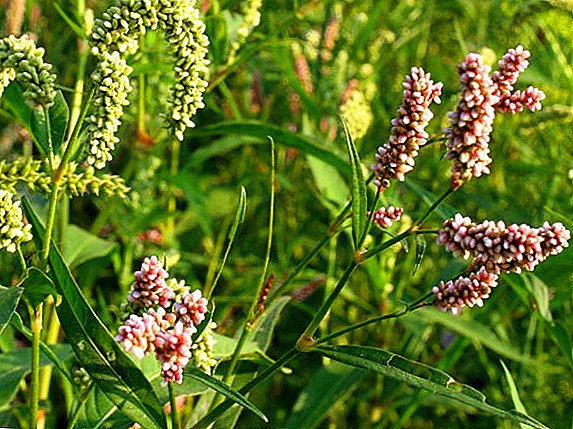 A beautiful lawn has always been and remains a wonderful decoration of the manor. The key to this is the correct selection of grass for planting. We will tell about one type of lawn grass - red fescue, we will give its description, a photo of lawns based on it.
A beautiful lawn has always been and remains a wonderful decoration of the manor. The key to this is the correct selection of grass for planting. We will tell about one type of lawn grass - red fescue, we will give its description, a photo of lawns based on it.
Short description
Lawn grass fescue red is common everywhere. Often found wild in dry sunny meadows. Great for pastures and lawns.
This perennial reaches a height of 70 cm, with creeping powerful roots. The stem is straight, smooth, with long, narrow leaves extending from its base. At the beginning of summer, spikelets are thrown out, which form panicles of red color (hence the name of the grass). 
Did you know? Fescue drought-resistant, bravely endures heat and cold.
The benefits of such a lawn
The main advantages can be considered:
- attractive appearance;
- flat lawn;
- heat and cold resistance;
- small maintenance costs;
- fast and uniform growth.

Applications with other lawn herbs
Fescue comes in a variety of lawn mixes. It is the most popular base along with meadow grass and rye grass. Seeds for mixtures should be selected so that the components complement each other and balance the weaknesses.
In such mixtures, fescue is highly competitive. In the poorly selected composition can suppress the remaining components.
Important! Select the composition for the mixture should be based on the purpose of the lawn. For greater resistance to damage, preference should be given to the high content of red fescue. For clay soils, select the option with a high proportion of bluegrass.

Location selection
The most suitable place is a sunny flat area with good drainage, fertilized with humus. The composition of the soil will suit any, except for heavy clay soil.
For universal lawns use mixtures based on the following grasses: grassland ryegrass, meadow bluegrass, meadow timothy.
Site preparation
Site preparation includes:
- Layout - Create a lawn plan and markup with twine and pegs.
- Cleaning - removing grass, stumps, bushes from the site.
- Digging - the cleared soil needs to be dug over for the best rooting of plants.
- Leveling - uneven lawn has an unaesthetic appearance. Therefore, it is better to take care of this as yet nothing is sown.
- Top dressing - after a flat area has been obtained, fertilizers can be applied (for example, mixtures of nitrogen, phosphorus and potassium).
- Compaction - necessary to avoid subsidence of soil after rains.
- The final alignment - the elimination of identified irregularities and previously unnoticed stones.
Sowing seeds
So, the plot is prepared and you can start sowing. If you plan to sow a large area - use seed drills. For small areas, you can get by with a manual operation. Sowing should be done in wet ground.
To do this, mix grass and earth (1: 1) and scatter it over the territory. Sowing depth - up to 1.5 cm. To prevent seed spreading by wind, powder them with peat. The seeding rate for fescue is 25 g per square meter. The best time for sowing is spring.
Fescue is uneven growth. It grows weakly, sometimes there are bald spots on the ground. But within two years the grass will gain strength and form a beautiful and green lawn. Reaches its maximum in the fourth year of growth. 
Care of sowing red fescue
Due to its unpretentiousness, the only care that the fescue needs is timely watering.
Did you know? In the UK, in order to save water resources, lawns are not watered. Even in the Royal Botanical Garden.
Without watering the grass will lose its original beautiful appearance, but will not die. Another procedure will be a regular lawn mowing.
The frequency of cutting should be selected individually, depending on the strength of grass growth. During the hot period, leave mowed grass on the ground - it will be an extra mulch and will protect the soil from drought. 
You will be interested to know about such types of fescue as gray and meadow.
Combating possible diseases and pests
Red fescue does not respond to most of the known plant diseases, tolerates air pollution with harmful gases. Not damaged by pests.
It is not resistant to fungi (cause rust and powdery mildew). To combat such diseases, use fungicides ("Topaz", "Previkur") or folk remedies (ash + soap).
Red fescue is a great choice for beginners in creating lawns, it is unpretentious, has positive reviews among professionals. Such a lawn does not give you trouble, even if you forget to water it in time.  Behind him does not require special care, he is resistant to trampling and damage. Good winters. And while it remains green and beautiful.
Behind him does not require special care, he is resistant to trampling and damage. Good winters. And while it remains green and beautiful.












